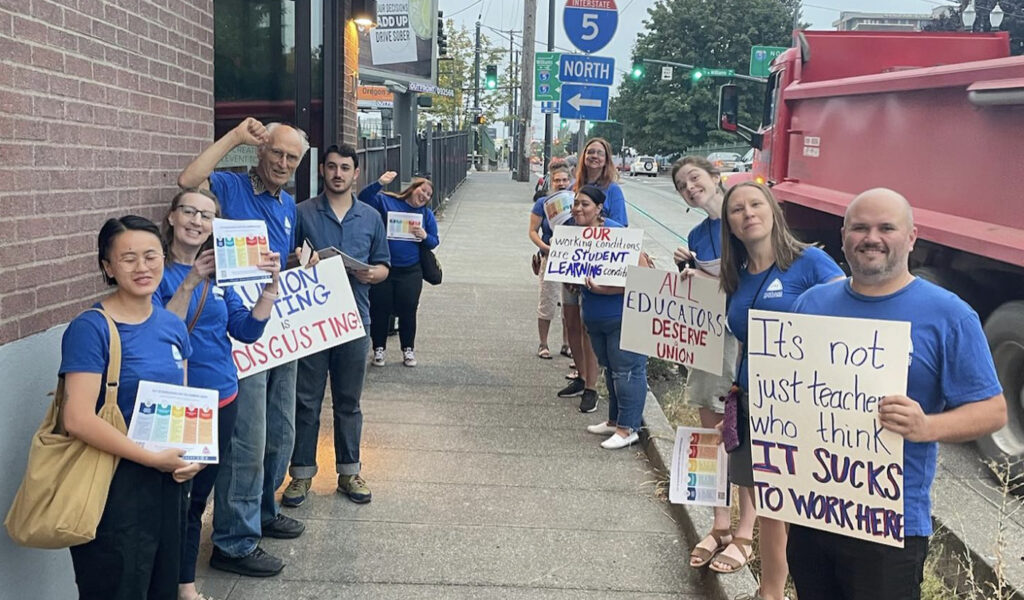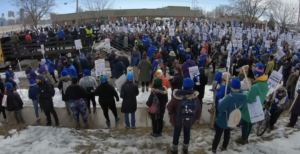Republican lawmakers pledge to ban harmful teacher strikes in Oregon after weeks of closed classrooms
Three Republican lawmakers have promised to legislation preventing teachers from walking off the job after nearly 50,000 students were shut out of Portland, Oregon schools for most of…

Three Republican lawmakers have promised to legislation preventing teachers from walking off the job after nearly 50,000 students were shut out of Portland, Oregon schools for most of November.
Oregon state representatives Vikki Breese-Iverson, R-Prineville, Jami Cate, R-Lebanon, and Christine Goodwin, R-Canyonville, all condemned the Portland teachers’ union for using kids as a bargaining chip before the union and district finally ratified a deal on Tuesday.
“Union bosses are using nearly 44,000 students as bargaining chips in their negotiations, causing irreparable harm to Portland families,” Breese-Iverson said, according to a joint statement from the trio.
“Teacher unions hold tremendous power, but instead of using it to prioritize the needs of students, they are making themselves part of the problem rather than the solution,” added Cate.
Many states have laws on the books regarding collective negotiation, and most prohibit public employee strikes. Oregon does neither.
However, laws don’t always prevent teachers from striking. A 2020 study found that hundreds of thousands of teachers joined illegal strikes in the past few years.
Legal or not, such strikes often do great harm to students.
Oregon was one of the states most affected by pandemic-era learning loss, and Portland may be forced to extend school into next summer to meet state requirements for instruction time.
Even Democrat Gov. Tina Kotek has condemned the strike, saying it was “not in the best interest of students or families.”
But she was careful not to be too critical of teachers’ unions, as the Oregon Education Association (OEA) and American Federation of Teachers–Oregon both endorsed her campaign.
The recent deal, valued at around $175 million, took weeks to negotiate with an already cash-strapped district.
When the union started its strike on Nov. 1, it was demanding exorbitant pay raises, 7 hours a week of designated planning time, CRT-oriented professional development, universal pre-K, and housing subsidies for low-income families.
Rep. Goodwin criticized both the union and the district for not finishing negotiations during the summer.
“The teacher union and PPS [Portland Public Schools] had all summer to negotiate before school was in session,” she said in the joint statement. “Instead, parents have to find ways to support their children during the eight hours per day they should be in school.”
Local families also testified to the burden caused by the strike closing schools.
“We have credit card debt like a lot of other people. We’re just digging the hole deeper,” mother Molly Boyl told local media. “We already paid for our childcare for November, so that money is gone, and the childcare is not there because it took place in school.”
“I am prepared physically, but mentally and keeping my children in the know of what they need to know and what they need to learn is a lot,” said parent Audrey Abernathy.
And teachers might have ended up shooting themselves in the foot by prolonging the strike.
The district recently announced that teachers missed so many days of classes that they’ll no longer be eligible for healthcare in December.
Instead, teachers will have to apply for COBRA insurance, which OEA says it will pay for. The district estimated the total cost to be $5.1 million just for one month of healthcare.



